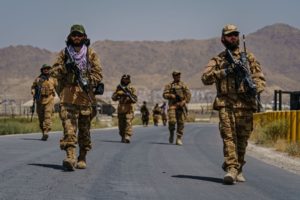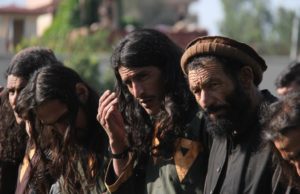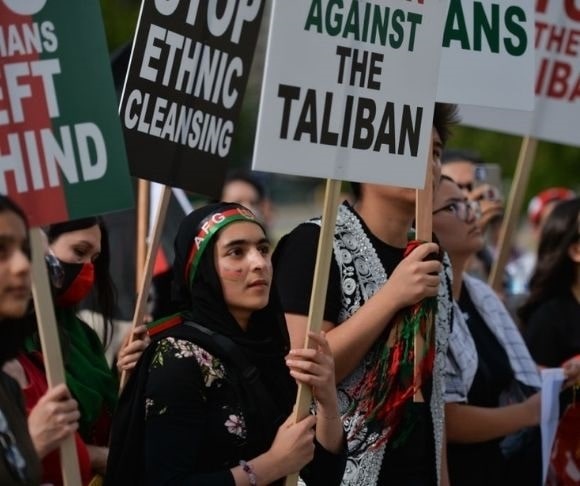Now that the Taliban has seized control of Afghanistan and ISIS-K has claimed responsibility for the bombing that took 13 U.S. military lives and many more civilians, a deeper look into the differences and potential connections between the Taliban and ISIS just might be in order.
Most Americans view both groups as terrorists, even though during the now-concluded evacuation the Taliban was reportedly working with the U.S. to get military and allies out of the country. To understand the difference and connection between the two, some background history is in order.
The Taliban

Taliban fighters secure the outer perimeter, alongside the American controlled side of of the Hamid Karzai International Airport in Kabul, Afghanistan, Sunday, Aug. 29, 2021. (MARCUS YAM / LOS ANGELES TIMES)
In the 1970s, rebel groups formed to fight against the Soviet Union’s occupation of Afghanistan. The Islamic guerrillas were known as mujahideen and fought against the invasion until the Soviets left in 1989. As civil war continued, more groups emerged from the mujahideen, including the militia group Taliban in 1994.
The Taliban managed to gain control and enforced strict Sharia law until al Qaeda attacked the United States on September 11, 2001. When it refused to give up al Qaeda’s leader, Osama bin Laden, U.S. forces invaded Afghanistan and banished the Taliban. Until President Joe Biden pulled American troops out of the country in August 2021, the organization had for those twenty years continued its largely fruitless efforts to regain control.
The Haqqani
This Sunni Islamist militant organization is considered the most dangerous but has close ties to the Taliban as well. It was founded by Jalaluddin Haqqani, a top Afghan warlord and commander during the Soviet occupation. Later, he allied with the Taliban and became the group’s Minister of Tribal and Border Affairs during the 1990s, after it had seized control of the country. He was also an associate of Bin Landen.
As the Counter Terrorism Guide reports, Jalaluddin’s son, Sirajuddin Haqqani, runs the day-to-day activities of the group. In 2015, he “was named as a deputy to newly appointed Taliban leader Mullah Akhtar Mohammed Mansur – cementing the alliance between the Haqqanis and the Taliban.” The Guide describes the organization as being:
“[C]onsidered the most lethal and sophisticated insurgent group targeting US, Coalition, and Afghan forces in Afghanistan; they typically conduct coordinated small-arms assaults coupled with rocket attacks, IEDs, suicide attacks, and attacks using bomb-laden vehicles.”
This group was also partially in control of Kabul security at the time of the recent suicide bombings.
The Islamic State (ISIS, ISIL, ISIS-K, ISKP)

Member of the Islamic state ISIS militants stand alongside their weapons, as they surrendered to government in Jalalabad, Nangarhar, Afghanistan on November 17, 2019. (Photo by Wali Sabawoon/NurPhoto via Getty Images)
ISIS first received attention in 2015 as it set out to topple American-influenced democratic politics and instead spread the ideology of a “caliphate” stronghold. The earliest recruits were former members of the Taliban. The head of the U.N. Assistance Mission in Afghanistan warned the U.N. Security Council that the group was positioned “to offer an alternative flagpole to which otherwise isolated insurgent splinter groups can rally.”
White House Press Secretary Jen Psaki was a spokesperson for the State Department under Barack Obama’s administration at the time. She said the group “represents a rebranding of a few marginalized Taliban.” In April 2015, ISIS-K claimed responsibility for a suicide bombing in Jalalabad that killed 33 people and injured 100 others. The attack took place outside a bank where government and military personnel were collecting their pay.
Two months after the attack, the Taliban sent a letter to ISIS leader Abu Bakr al-Baghdadi asking that he not recruit from Taliban forces. “Jihad against American invaders and their slaves in Afghanistan must be under one flag, one leadership and one command,” the letter said.
In August 2020, Afghan Interior Minister and NDS Director General Masoud Andrabi tweeted that the leader of ISIS-K, Shahab al-Mahajir, was a member of the Haqqani Network. “Haqqani & the Taliban carry out their terrorism on a daily basis across Afg & when their terrorist activities does not suit them politically [sic] they rebrand it under ISKP,” he posted on the social platform.
The Connection?
 Most obviously, the groups do not like American politics or Americans in their country. They are also willing to go to extreme measures to achieve their goals with suicide bombings and other violent attacks. The difference between the Taliban and ISIS seems to be the degree of strict rulership and Islamic laws – with the former claiming not to be as harsh. Both factions want supreme control of Afghanistan and its people.
Most obviously, the groups do not like American politics or Americans in their country. They are also willing to go to extreme measures to achieve their goals with suicide bombings and other violent attacks. The difference between the Taliban and ISIS seems to be the degree of strict rulership and Islamic laws – with the former claiming not to be as harsh. Both factions want supreme control of Afghanistan and its people.
President Biden in a recent speech said there are no indications that the Taliban had anything to do with the Kabul bombing and that the Taliban and ISIS are “sworn enemies.” Yet, although the Taliban and ISIS clash periodically, they still seem to collaborate frequently. “As was revealed in 2020, the terror attack at the Sikh shrine in Kabul, which left 25 dead, had been carried out by a team of cooperators from both ISIS-K and the Haqqani Network, a Taliban special forces squad,” wrote Liberty Nation Managing Editor Mark Angelides, “ISIS-K claimed responsibility for that attack, but it was carried out with help from the Taliban. So how can these two groups that share a similar ideology, work together to kill innocents, and share many of the same members, be described as ‘sworn enemies?”
~
Read more from Kelli Ballard.




